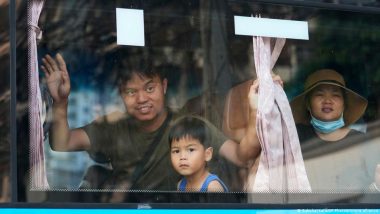More than 60 Chinese Christians have been resettled in Texas after three years of seeking refuge abroad. Despite the positive outcome to their case, observers say the state of religious freedom in China remains "bleak."A group of 63 Chinese Christians was resettled in the US states of Texas last week after facing years of government persecution in China.
"Freedom Seekers International will aid in the resettlement of the exiled church," said ChinaAid, a humanitarian organization helping persecuted Chinese people.
Also Read | First Person to Die From Common Bird Flu Strain H3N8 in World Is 56-Year-Old Woman From Southeast China.
They arrived following "close coordination with the US Department of State, Department of Homeland Security, various UN agencies, and the Thai government," the NGO said.
The group's journey from the southern Chinese city of Shenzhen has been turbulent and threatening since they left China in late 2019.
Harassment, surveillance and detention
After facing years of crackdown and persecution — including repeated police raids and property confiscation — members of the Shenzhen Holy Reformed Church (SHRC) arrived in South Korea in late 2019, hoping to be granted refugee status.
However, they said they continued to face threats and intimidation from the Chinese government.
After being told by immigration lawyers that their chance of getting refugee status in South Korea was slim, the group headed to Thailand in August 2022, hoping to apply for refugee status with the United Nations Refugee Agency (UNHCR).
"We knew if we kept staying in South Korea, we wouldn't be able to make it to our final destination, and we were done living without legal identities in a country," said Pan Yongguang, the church's pastor.
The Chinese Christians told reporters that when they arrived in Thailand, they were immediately followed by strangers who took photos and videos of them almost on a daily basis.
Despite their efforts to change hotels, they said the stalking and harassment continued.
"I've seen the Chinese operatives take videos and pictures of them and we never knew at what point the operatives would kidnap the church members and repatriate them to China," said Deana Brown, founder and CEO of Freedom Seekers International (FSI), an organization that focuses on facilitating refugee resettlement to the United States.
Brown and her group had spent time with the Chinese Christians over the past year.
Detained in Thailand
On March 30, immigration police in Thailand arrested the entire congregation of the Shenzhen church.
According to Brown from FSI, Thai police first took them to an immigration center, then transferred them to a local police station.
After going to court the next day, authorities said they would be driven back to their residence in the costal city of Pattaya, but they were instead driven to a detention center in the Thai capital, Bangkok.
"When we got to Bangkok, the church members were taken straight to the detention center. That was frightening and difficult," Brown told DW, adding that the "imminent danger" facing the Chinese Christians, who were at risk of being deported back to China, pushed her group and other organizations to work with US authorities that ensured the ultimate resettlement of the 63 Shenzhen church members to Texas.
"The Shenzhen church members are lucky that they were resettled to the US, rather than being deported back to China," said Patrick Poon, a visiting researcher at the University of Tokyo.
"It's always risky for Chinese Christians to seek asylum abroad. Even if they are in countries like Thailand, they will still face the potential danger of being arrested and deported back to China."
Pressure from China increases the risks
According to Bob Fu, founder of ChinaAid, many ethnic minorities or Chinese dissidents who tried to acquire UN refugee status in Thailand have been deported or abducted back to China, raising suspicion and concerns that the Thai authorities may have helped Beijing in some of these operations.
Some analysts say that one of the reasons Chinese Christians or dissidents face immense risks while trying to seek asylum or apply for refugee status in countries like Thailand is because of pressure from China.
"Thailand and other countries near China will often feel the pressure from Beijing, so they may complicate the process for Chinese Christians or dissidents to get refugee status or even deport them back to China in the more extreme cases," said Yaqiu Wang, senior China researcher at Human Rights Watch.
Poon from the University of Tokyo told DW that the UN refugee agency has a responsibility to address the risks facing asylum seekers, especially those from China.
"They should negotiate with the Thai government to create a sanctuary that can ensure refugees' safety," he told DW, adding that given the uncertainties facing Chinese dissidents or Chinese Christians, the UN may also have to consider whether there is a need to move the UN refugee agency's regional hub to another country in Asia.
Rui-Teng Ren — a member of the Early Rain Covenant Church in Chengdu who now lives in exile in the US — said while Chinese Christians will continue to find ways to uphold their religious belief, the level of risks that they have to face in China will likely grow.
"More preachers are being arrested now, and in many cases, Chinese authorities will put pressure on members of Christian churches by targeting their family members," she said.
"It's gradually becoming a trend that Christians in China will face more threats to their personal safety going forward."
Edited by: Keith Walker
(The above story first appeared on LatestLY on Apr 12, 2023 04:50 PM IST. For more news and updates on politics, world, sports, entertainment and lifestyle, log on to our website latestly.com).












 Quickly
Quickly


